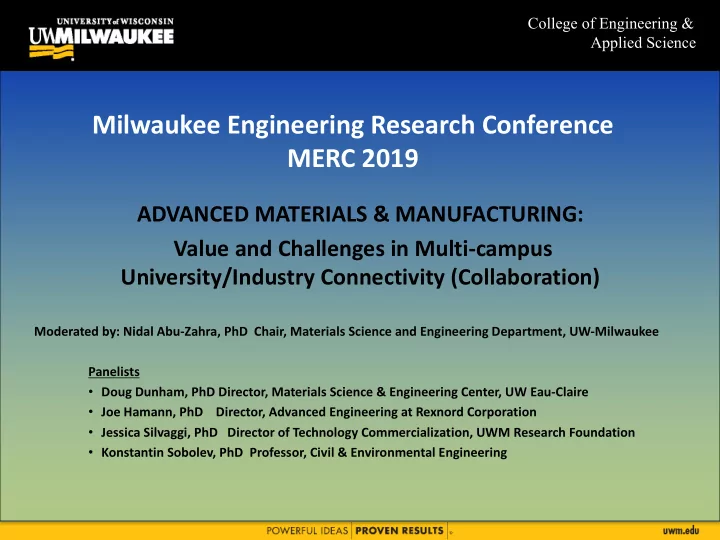

College of Engineering & Applied Science Milwaukee Engineering Research Conference MERC 2019 ADVANCED MATERIALS & MANUFACTURING: Value and Challenges in Multi-campus University/Industry Connectivity (Collaboration) Moderated by: Nidal Abu-Zahra, PhD Chair, Materials Science and Engineering Department, UW-Milwaukee Panelists • Doug Dunham, PhD Director, Materials Science & Engineering Center, UW Eau-Claire • Joe Hamann, PhD Director, Advanced Engineering at Rexnord Corporation • Jessica Silvaggi, PhD Director of Technology Commercialization, UWM Research Foundation • Konstantin Sobolev, PhD Professor, Civil & Environmental Engineering
College of Engineering & Applied Science Discussion Topics What constitutes a “successful” industry/university • partnership: metrics and values Benefits and challenges in strategic partnerships • Multi-campus university/industry connectivity – potentials • and challenges Lessons learned in Wisconsin •
College of Engineering & Applied Science Acce ccess ss to the unive versi sity y physi ysica cal faci cilities Tax x cr credits Acce ccess ss to Acce ccess ss to highly y gove vernment funding ski skilled rese search chers Acq cquisi sition of IP IPs To acce ccelerate or improve ve exi xist sting rese search ch Public c image in the so soci ciety Acce ccess ss to new tech chnologies s for a co competitive ve adva vantage Industry Improve ve profitability Improvi ving ski skills s of employe yees Ability y to recr cruit talented st students Incr creasi sing tech chnica cal awareness ss in R&D Creating a cu culture of innova vation
College of Engineering & Applied Science University Creating entrepreneurial culture Integration into labor market Fulfills mission of positive Updated impact on society technical Budget knowledge Supplement Access to IP royalty industrial information Access to networks Recruitment of knowledge of skilled Access to creation and staff and government utilization students funding University Ranking
College of Engineering & Applied Science Skilled students Financial Access to Practical rewards Career Resources applications development Research Sense of funding accomplishment IP shares Practical knowledge Researcher
College of Engineering & Applied Science Researcher Industry University Entrepreneurs
College of Engineering & Applied Science
College of Engineering & Applied Science Communication Gap v Difficult to identify academic research that can be developed into commercial products. Most research papers do not highlight the potential for commercial applications of their findings.
College of Engineering & Applied Science Cultural Gap Culture of The University Culture of Industry v C ommunalism – Public knowledge v P roprietary – as little as necessary is made public v U niversalism – scientific findings are evaluated objectively regardless of v L ocal – focused on local ranks or status technical problems v D isinterestedness – neutral and v A uthoritarian – acting within impersonal judgement a hierarchy in the workplace v O riginality – new contributions to v C ommissioned – to achieve existing knowledge specific practical goals (ROI) v S kepticism – requires critical scrutiny, v E xpert – expert problem debate, peer review and contradiction solving rather than creativity The difference between academic and industrial science, Dr. Shawn Cunningham, 2011
College of Engineering & Applied Science Lack of Long-Term Relationships v Mostly transactional relationships not strategic; sometimes limited partnership with individual faculty on an as-needed basis. Uncertainty in Relationships = Uncertainty in ROI
College of Engineering & Applied Science Reluctance to Collaborate between Industry Partners Companies who view one another as competitors within an industry, rather than collaborators working on a national interest, are reluctant to cooperate to solve common manufacturing problems Thomas-Kilmann Conflict Mode Instrument (TKI)
College of Engineering & Applied Science Ability of businesses to recognize the Absorptive Capacity value of new external knowledge, assimilate it and apply it to UK National Centre for Universities and Business, “Best practice strategies for successful innovation through university-Business collaboration” Dec. 2013. commercial ends. Absorptive Capacity EXPLOITATION AWARENESS Potential Realized receptiveness to capacity to exploit the external knowledge knowledge absorbed TRANSFORMATION ASSIMILATION AQUISITION
Skill Gaps MR Shop floors “Mixed Reality” Deloitte University Press Tech Trends 2017 The kinetic enterprise
College of Engineering & Applied Science In the US, contributions by the private sector account for less than 5% of university R&D budgets
Recommend
More recommend